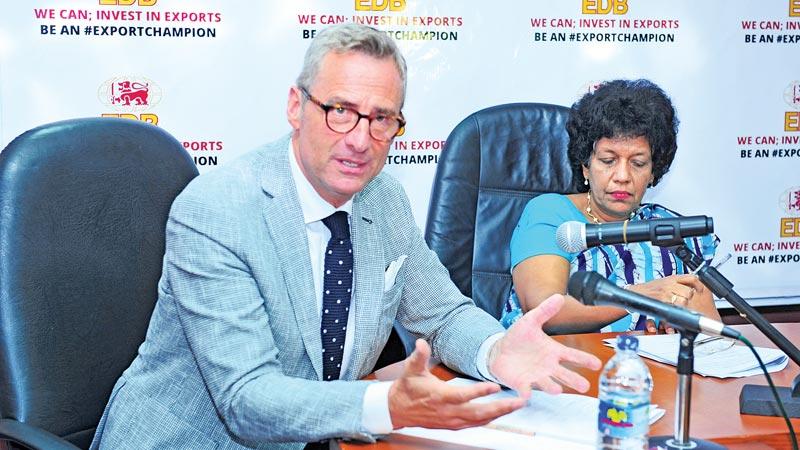
The Sri Lanka Export Development Board (EDB) has laid the groundwork to develop an international wellness tourism strategy and a brand development initiative within a year, to help position the country as a leading player in the US $ 2.6 trillion global wellness tourism industry, under the five-year National Export Strategy (NES).
In the first phase, the EDB procured the services of international consulting firm, Linser Hospitality GMBH, based in Austria, to undertake a ‘Rapid Assessment of the Potential Wellness Tourism Industry in Sri Lanka’ with financial and technical assistance from Australia’s Market Development Facility (MDF) with an investment of Rs. 9 million.
The lead consultant and Linser Hospitality GMBH Managing Director Dr. Franz Linser, who was on a five-day visit to Sri Lanka, conducted a stakeholder discussion with key industry players at the EDB premises last week.
The rapid assessment would be conducted via three components: demand survey, supply survey and competitive analysis. The assessment, which is due to be completed in December, will provide an overview and analysis of the country’s wellness tourism capacity and will define its existing unique selling proposition with insights into the strengths and weaknesses of the wellness tourism infrastructure and overall communication, Director General EDB Jeevani Siriwardena said.
“The European Union (EU) in principal has agreed to assist Sri Lanka with 80 percent of the funding for phase two of the international brand development exercise next year, following the conclusion of the rapid assessment study,” she said
Based on the study, Dr. Linser said that Sri Lanka would be able to develop a short, medium and long-term strategy to maintain and secure new markets to position the country as an attractive destination for wellness tourists.
The second phase of the initiative is consisted of product development, brand evaluation and development and a developing marketing strategy for Sri Lanka’s wellness industry.
The second phase will focus on the long-term tangible benefits, such as quality jobs in the tourism sector as a result of approaching the new sophisticated markets through a fresh product range as well as an increase in high-value wellness tourists from envisaged markets leading to a overall greater revenue generation for the sector.
The EDB plans to procure services of an international consulting firm to carry out the brand strategy development for the wellness tourism sector as similar to the ICT/BPM sector, next year.
The customisation of wellness tourism products, catering to the needs of the modern complicated lifestyles while targeting new markets, would be crucial for Sri Lanka to become a leading player in the global wellness tourism industry, Dr. Linser said. “Sri Lanka has a distinct advantage compared with other destination considering its omnipresent healing environment across the country, combined with its deep-rooted Ayurveda system and other alternative medicines. People no longer complain about flying long hours to fix their lifestyle problems, such as being overworked, anxious and stressed. However, it has to be worthwhile arriving at that particular destination. We want to design a strategy where people want to come and benefit from this incredible asset that Sri Lanka has in Ayurveda,” he said.
“Sri Lanka was blessed with a centuries-old treasure trove of indigenous knowledge, environmental assets and cultural heritage. Being close to healing surroundings is a growing notion and people from around the world are looking at places to enjoy this bliss away from their busy schedules on a minimum 10-day visit to fix their lifestyle problems. Sri Lanka has abundant natural assets, such as highlands, lowlands, beaches and rainforests that allow people to be closer to nature,” he added. Sri Lanka’s wellness tourism industry is at an early stage of development with the growth of the sector driven randomly by private establishments concentrating on hotel spas, Ayurveda resorts and spas, beauty clinics and yoga retreats.
The EDB added wellness tourism to the export basket from last year. According to statistics, Sri Lanka earned $ 193 million from the sector in 2018. The UK, Austria, Germany, Switzerland and Australia have been recognised as initial focused markets to promote wellness tourism.
In identifying constraints to growth of wellness tourism industry, it was proposed in the NES to develop a wellness tourism strategy while setting up a quality assurance system for the wellness and traditional medicine sectors is also mooted.
Further, it was proposed to amend the regulations on Ayurveda to include a new compulsory regulatory and licensing system for spas.
According to the Global Wellness Institute, in recent years, Sri Lanka has experienced a number of hotel/resort spas and traditional Ayurvedic resorts transforming themselves into destination spas and wellness retreats that provide a holistic package of services, experiences or journeys.
The Gulf/MENA states, former Soviet Union countries, Eastern Europe, the Far East and Australia have been identified as potential new markets for traditional medicine, apart from the Western European and Northern American countries.
A year into implementation, the demand-driven Wellness Tourism Strategy, steered by its public-private platform, will lead Sri Lanka to capitalise on the $ 4.2 trillion global wellness industry by 2019.
In line with the objectives of branding and promotion and the strategic Action Plan, the EDB is spearheading an International Brand Development Initiative to develop a strong national brand for wellness tourism in Sri Lanka.
